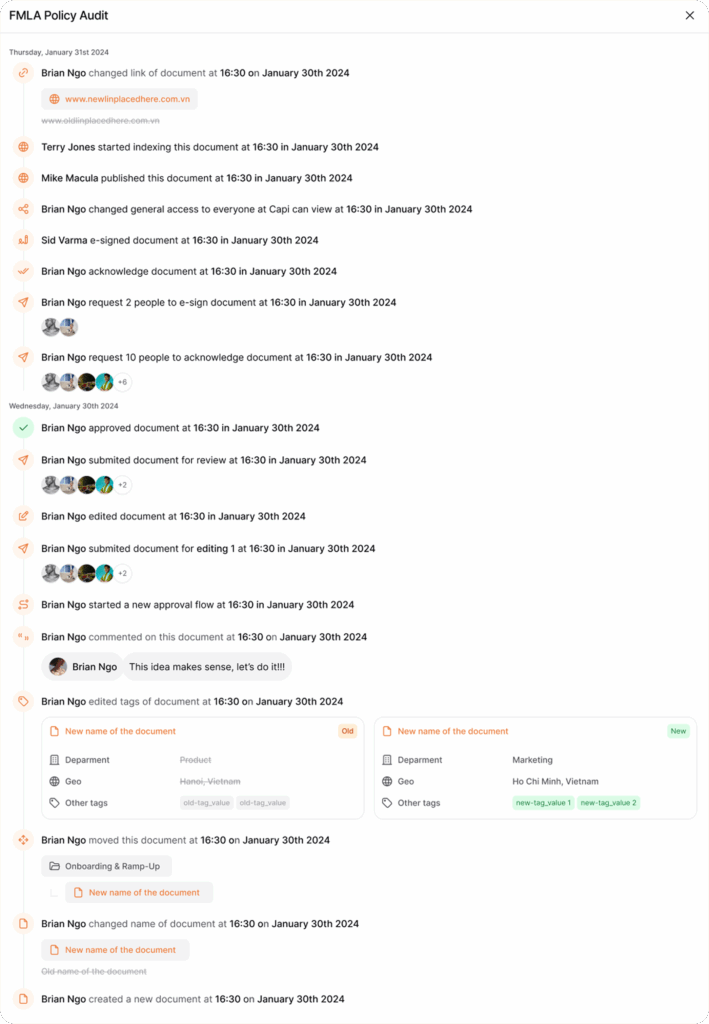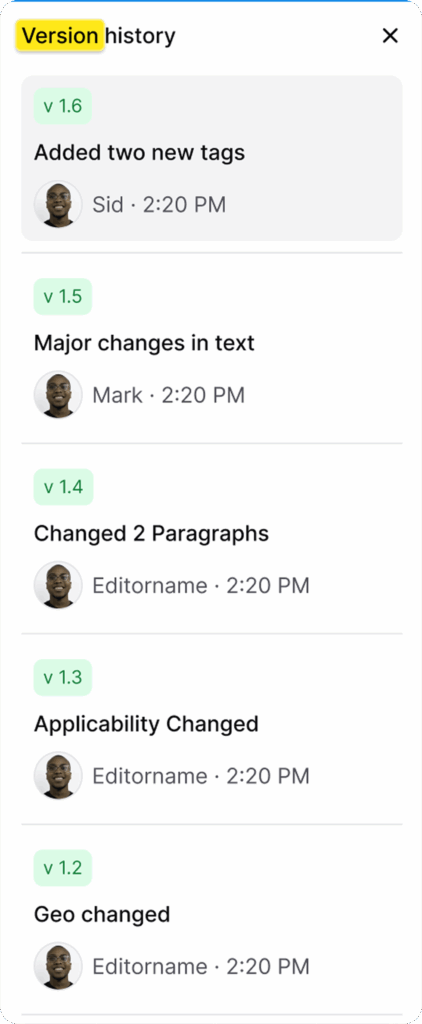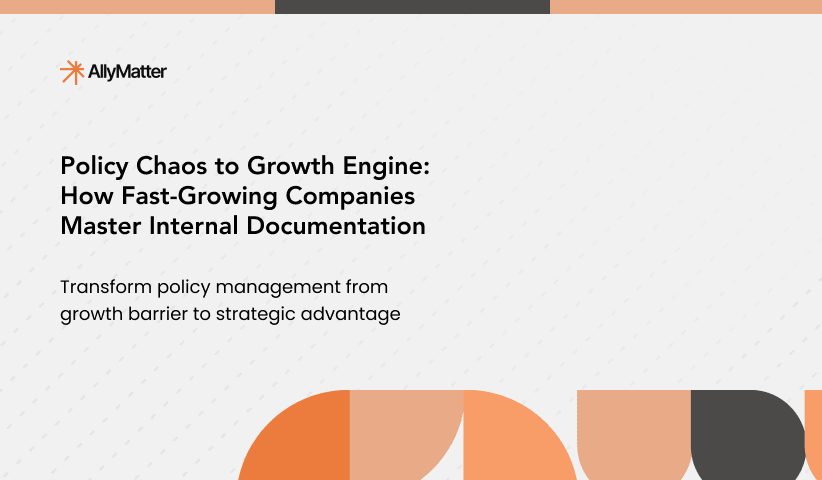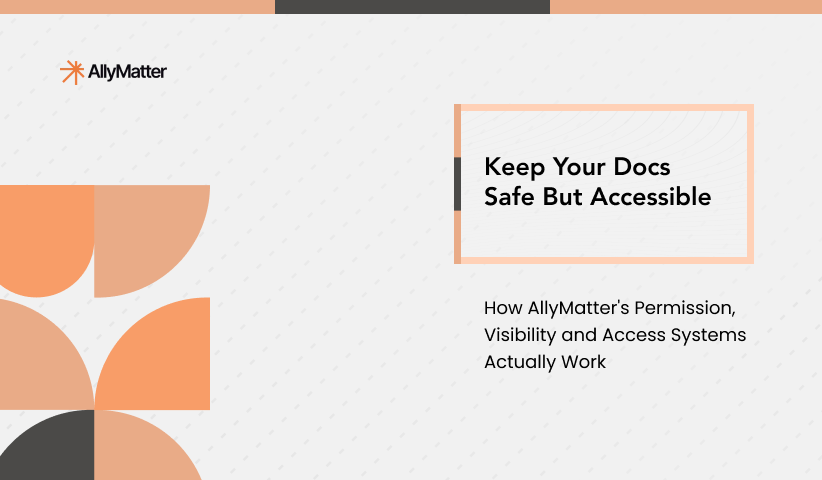Operations leaders face a constant battle: standardizing processes while maintaining flexibility to adapt. When your team’s knowledge lives in scattered documents, email threads, shared drives, and your longest-tenured employees’ heads, inconsistencies become inevitable.
As you scale from 50 to 500 employees, tribal knowledge that once spread naturally through small teams becomes a critical vulnerability. Each department develops its interpretation of processes, vendors receive inconsistent communications, and quality varies between locations or shifts.
Operations excellence depends on standardized, accessible knowledge. Here’s how an internal knowledge base like AllyMatter transforms operations teams from documentation chaos to operational excellence:
How AllyMatter helps operations teams standardize and scale
AllyMatter’s enterprise knowledge management platform addresses the specific challenges operations teams face when scaling from startup to growth stage. Here’s how it transforms operations from scattered documentation to systematic excellence
1. Create standardized processes that scale across locations
When operations expand across multiple locations, maintaining consistency becomes challenging. Without standardized documentation, each site develops its own interpretation of processes, creating quality variations and efficiency problems.
AllyMatter centralizes your standard operating procedures (SOPs) in one accessible platform, ensuring every location follows identical processes. When teams in different regions or facilities need guidance, they access the same approved documentation rather than relying on local interpretations or outdated printed manuals.
2. Preserve tribal knowledge before it walks out the door
Growing companies often rely heavily on experienced team members who carry critical operational knowledge in their heads. When these key employees leave, their expertise leaves with them unless you’ve documented it properly.
AllyMatter’s structured documentation tools help you capture and preserve tribal knowledge, transforming individual expertise into organizational assets. The platform’s user-friendly editor makes it simple for subject matter experts to document exceptions, edge cases, and troubleshooting procedures that might otherwise remain undocumented.
With AllyMatter, you create dedicated knowledge capture sessions where experienced team members document their approaches to common scenarios and edge cases. Using AllyMatter’s WYSIWYG editor to include diagrams, images, and step-by-step instructions, you can ensure specialized knowledge is accessible to everyone.
3. Streamline onboarding and operational training
Without structured documentation, training new operations team members becomes inconsistent and inefficient. Trainers may emphasize different aspects of processes, creating knowledge gaps that lead to performance variations.
AllyMatter transforms your operational documentation into comprehensive training resources. New team members can access standardized process documentation, complete with visual aids and clear step-by-step instructions. This consistent approach ensures all employees receive identical training, regardless of who conducts it.
For example, you can create dedicated onboarding sections within your knowledge base that walk new hires through department-specific procedures with visual guides, videos, and interactive checklists that standardize the learning process.
4. Break down silos between departments
When departments operate in isolation, inefficiencies multiply. Finance implements payment procedures without understanding procurement workflows, while operations teams lack visibility into IT’s system maintenance schedules.
AllyMatter connects interdependent documentation across departments, showing operations teams how their processes interact with other functions. The platform’s tagging and categorization features make it easy to link related processes from different departments, creating a unified view of cross-functional workflows.
Using AllyMatter, you can tag documents by department and process type to create connections between related procedures. For example, link vendor management documentation to related payment procedures and quality control checks, ensuring operations teams understand the full process landscape.
5. Simplify compliance and streamline audits
Operations teams often scramble to prepare for audits, pulling documentation from various sources and struggling to demonstrate process consistency. This reactive approach creates stress and increases compliance risks.
AllyMatter’s comprehensive audit trail and version tracking make compliance management proactive rather than reactive. The platform maintains detailed records of document changes, approvals, and acknowledgments, creating a defensible audit trail. When auditors request documentation, operations teams can quickly provide complete records with full version histories.

For instance, when preparing for ISO 9001 certification, operations teams can produce consistent process documentation with complete revision histories, dramatically reducing audit preparation time while demonstrating solid quality management practices.
6. Centralize vendor management documentation
Growing companies often struggle with fragmented vendor information. Contract details live in legal files, payment terms in finance’s systems, and performance metrics in operations’ spreadsheets. This fragmentation creates confusion and inefficiency when managing supplier relationships.
AllyMatter creates a central repository for all vendor documentation, accessible to everyone who works with external partners. Operations teams can find vendor contacts, service agreements, quality requirements, and issue escalation procedures in one location, ensuring consistent supplier management.
7. Document equipment and maintenance procedures
Equipment downtime costs manufacturing companies an average of $260,000 per hour according to Aberdeen Research. Growing companies often lack comprehensive documentation for equipment operation and maintenance, leading to inconsistent practices and preventable failures.
AllyMatter simplifies the creation and distribution of equipment documentation, maintenance schedules, and troubleshooting guides. Operations teams can document proper equipment usage with images and videos, create maintenance checklists, and develop troubleshooting decision trees that help operators resolve issues quickly.
One practical application would be documenting each piece of equipment with visual operating procedures, maintenance checklists, and troubleshooting guides. You can use AllyMatter’s approval workflows to ensure documentation reflects current best practices and remains updated when procedures change.
8. Establish clear approval workflows for critical processes
Inconsistent approval processes create bottlenecks and confusion. When approval requirements aren’t clearly documented, team members either skip essential validations or waste time seeking unnecessary approvals.
AllyMatter’s smart approval flows create structured, transparent approval processes for critical operational documents and procedures. The platform allows operations leaders to define approval requirements based on document type and importance, ensuring appropriate oversight without creating unnecessary bureaucracy.

You can create tiered approval workflows where routine documents require minimal validation while high-risk procedures receive multiple reviews. The system automatically routes documents to the right approvers and tracks completion, eliminating manual follow-up.
9. Track and implement process improvements consistently
When operations teams develop process improvements, ensuring consistent implementation across the organization becomes challenging. Without proper documentation and distribution, valuable enhancements remain isolated in specific teams or locations.

AllyMatter tracks process improvements and ensures consistent implementation across your organization. The platform’s version control features make update distribution seamless, while approval workflows ensure changes receive proper validation before implementation.
10. Build scalable quality control processes
Quality control becomes increasingly complex as companies grow. Without standardized documentation, quality standards vary between teams and locations, creating inconsistent customer experiences and inefficient operations.
AllyMatter enables operations teams to build comprehensive, scalable quality management systems. The platform supports detailed inspection checklists, quality standards, and non-conformance management procedures, ensuring consistent quality regardless of who performs the inspections or where they occur.
It helps you create visual quality control checklists with clear acceptance criteria, examples of conforming and non-conforming products, and standardized correction procedures. You can use AllyMatter’s acknowledgment features to verify that quality inspectors understand and apply the standards consistently.
Transforming operations knowledge into your competitive advantage
Operational excellence comes from consistent execution of well-designed processes. An internal knowledge base like AllyMatter enables you to centralize and standardize your operations documentation. This helps you transform scattered tribal knowledge into a strategic asset that scales with your business.
The most successful operations teams don’t just document processes; they create living knowledge systems that evolve and improve as the organization grows. AllyMatter provides the structure and tools needed to build this foundation, enabling operations teams to maintain quality and efficiency even during rapid growth.
Ready to standardize operational excellence? Join the AllyMatter waitlist to transform how your team manages critical knowledge.
Frequently asked questions
How do you build an internal knowledge base for operations teams?
Start by identifying your most critical processes and tribal knowledge. Document standard operating procedures, equipment manuals, and quality control processes. Use approval workflows to ensure accuracy and assign ownership to subject matter experts for ongoing maintenance.
What should be included in an operations knowledge base?
Include SOPs, equipment documentation, vendor information, compliance procedures, troubleshooting guides, quality control checklists, and safety protocols. Focus on information that operations teams access regularly or need during critical situations.
How do you ensure operations team members actually use the knowledge base?
Make it easily searchable with smart tags and categories. Integrate it into daily workflows and train team members on its benefits. Keep content current and assign clear ownership for updates. Use analytics to identify usage patterns and improve accordingly.
What’s the difference between an operations manual and a knowledge base?
A traditional operations manual is static documentation, while a knowledge base is dynamic and searchable. Knowledge bases support multimedia content, version control, and collaborative updates. They also provide better search functionality and can integrate with other business systems.
How often should operations documentation be updated?
Review critical documents quarterly and update immediately when processes change. Use automated workflows to trigger reviews when equipment is modified or new regulations are implemented. Track document usage to prioritize updates for frequently accessed content.


